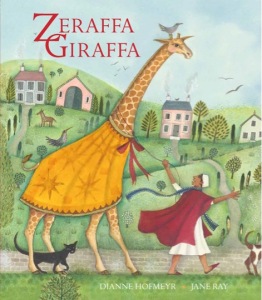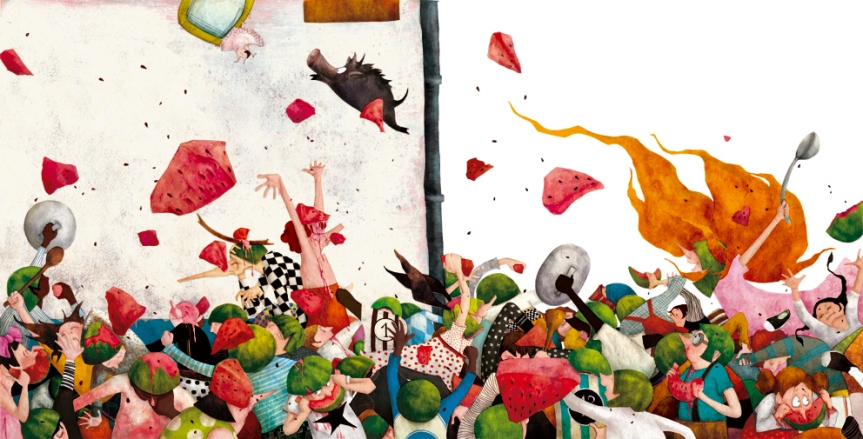The 22nd annual IBBY/NCRCL MA Conference took place on 14 November 2015 at the University of Roehampton. This year’s theme was ‘Steering the Craft: Navigating the process of creating children’s books in the 21st century’. This week on the NCRCL blog, alumni and current NCRCL students will be reporting on various aspects of the conference, including the speakers, panellists and parallel sessions.
Steering the Craft: A distance learning student reflects
By Laura Hogevold
The lack of face-to-face contact as a distance learning student has made me feel isolated and detached from reality at times during my first term of study. All of this reading and theorising in a virtual world is difficult to explain to friends and family.
The IBBY/NCRCL conference gave me a great opportunity to legitimise my studies and find out what Roehampton is really like. Within minutes of arriving, I was relieved to meet a fellow student in a similar position to me (although she lives abroad). We hit it off straight away and talked openly about why we had decided to pursue this course at this stage in our lives. We were both the same age, both had young children and had both reached a turning point in our careers. The prospect of finding out more about the children’s book industry was very exciting!
Lisa Sainsbury of the NCRCL introduced the day’s proceedings with a solemn acknowledgement of the previous evening’s atrocities in Paris. It was important to note the presence of IBBY in our neighbouring countries, as well as globally.
The first speaker was Julia Eccleshare, children’s books editor at The Guardian. Julia discussed the role of reviews in children’s literature and explained the importance of new writers being able to navigate the “noise” around books in order to get heard. Independent and objective reviews provide validation and encouragement for authors and this is vital if we want to keep talented writers in the market, she pointed out. They also assist parents and teachers in choosing which books to purchase and recommend, another necessary role.
Next were Jane Ray and Dianne Hofmeyr who guided us through the process of collaborating as illustrator and author on a children’s book. It was a very personal presentation of emails, notes, sketches and communication with editors and publishers. Their book Zeraffa Giraffa has reached The Sunday Times Top 100 Children’s Classics List.

Nicky Singer followed with an emotional and thought-provoking talk about commercialism in the book industry. She discussed how large marketing teams and small editorial teams have become the norm in publishing with books being treated as marketing commodities. She talked about the struggle to get her book Island published because it was apparently “too quiet” for the market with “not enough adventure”. Her frustration and passion spilled out with every word and she received a very long and loud applause from the delegates.
In the parallel session I attended, Siwan Rosser asked “Do we really need Dahl in Welsh?” A discussion of the need to balance the promotion of the Welsh language through literature with the potential loss of readability through translation, and the impact on Welsh writers struggling to publish new books in competition with translated versions of Dahl and others.
Yan Zheng gave us a talk on story apps and the touch screen in 21st century storytelling, asking how we should evaluate story apps and opportunities for future storytelling. There are so many issues to consider when reading a book or taking part in a story app including whether we should try to predict readers’ behaviour – and how to stabilise a narrative when it is in such a dynamic format.
Finally, Kerenza Ghosh told us about her project to encourage Reception and Year 1 children to produce their own picturebooks based on Wild by Emily Hughes – a selection of beautifully drawn and presented books from 4 and 5 year olds. It was a fascinating insight into the activities that help children become engaged in literacy.
After lunch, IBBY President Wally de Doncker gave a humble talk about the importance of the global presence of IBBY and its aim for every child in the world to become a lifelong reader, claiming that “Children’s books are a country’s best ambassador”. IBBY hopes for reading to become a basic right around the world.
Clémentine Beauvais, who writes for both French and UK markets, gave a lively talk about the differences between books in the two countries – namely how little French writers get paid, and how inoffensive the UK market wishes to make books for its children! She discussed what seems to be a fight between writing as a craft, and as a commercial enterprise and gave accounts of “terrifying French picture books” and “unsophisticated UK readers”!
Translator Daniel Hahn allowed us to explore the process of translating a Portuguese book into English: Happiness is a Watermelon on Your Head. He gave a step-by-step account of how he arrived at the “translated” book by completely re-writing the story – changing text position, character names, pace and tone and introducing verse, whilst managing to preserve the narrative.

Then, we were addressed by three very different publishers – David Maybury, from Scholastic, Barry Cunningham, from Chicken House, and Anna McQuinn, from Alanna Books – who discussed the book world from their perspective and attempted to defend the industry against some of the negative claims made earlier in the day.
The day ended with a chat between Melvin Burgess and Barry Cunningham. Barry explored what motivated Melvin and why he chose to write books that courted controversy. It provided an insight into the intentions and life of a successful author who writes books to inform, educate and provoke discussion with young adult readers.
Laura Hogevold has recently begun her studies with the National Centre for Research in Children’s Literature, as a distance learning student on the MA Children’s Literature programme.
